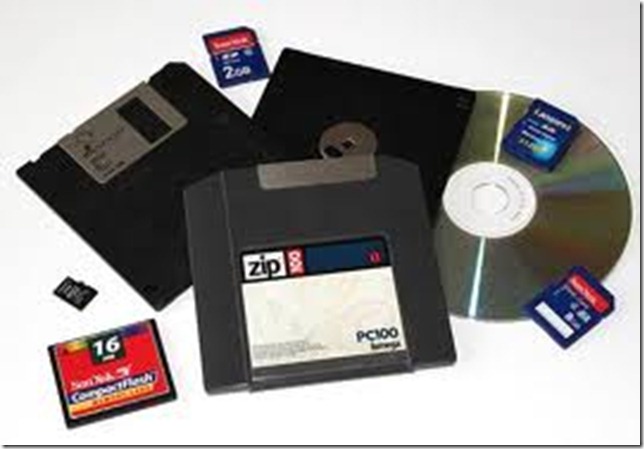Comparison of Storage Media
COMPARISON OF DIRECT ACCESS BACKING STORES
Advantages of exchangeable hard discs
Over fixed-head discs
1 They can be stored away from the computer.
2 Drive units are cheaper.
Over floppy discs
1 They have far greater capacity.
2 There is faster transfer of data.
3 They are more reliable-there is better protection against dirt.
Advantages of discs which are not exchangeable
1 They can be more effectively sealed against dirt.
2 More data can be stored on a given area of disc.
Advantages of fixed-head discs
Over moving-head discs
There is no seek time, so the access time is very short.
Advantages of floppy discs over other direct access media
1 Drive units are small and inexpensive.
2 Discs are cheap.
Advantages of bubble memory
1 There are no moving parts.
2 There is short access time.
Disadvantage of bubble memory
It is expensive for a given amount of storage.
Advantage of compact discs
There is very large storage capacity.
Disadvantage of compact discs
At the moment they are read only.
Worked question
For each of the three installations listed suggest one single disc unit which would be suitable for it. The units suggested for the three should all be different from one another. Give reasons for your choice in each case. The installations are:
1 A medium-sized mainframe computer used for batch work.
2 A network of microcomputers.
3 A home microcomputer.
1 The mainframe computer installation would require a hard disc unit with interchangeable disc packs. If they were only buying one unit a fixed disc unit would probably not store enough data for them.
2 The network of microcomputers would require a small fixed hard disc unit with a single disc. Exchangeable discs would not be satisfactory as different users would require different discs.
In any case floppy discs would probably not hold enough data and a large exchangeable disc
unit would be too expensive.
3 The most suitable storage for the home microcomputer would be a floppy disc unit. The owner might consider a small hard disc unit. However, they are expensive and also tend to be a bit noisy for home use.
COMPARISON BETWEEN MAGNETIC TAPE AND EXCHANGEABLE HARD DISCS
Advantages
Of disc over tape
1 There is direct access-data can be accessed from anywhere on a disc equally quickly. This makes it suitable for information retrieval. Tapes are not suitable for this.
2 Data is addressable- it can be accessed by giving track number and sector number (and, if necessary, cylinder number).
3 There is faster transfer of data-speeds vary widely hut discs are usually faster than tapes.
Of tape over disc
1 It is light and compact. Tapes are easy to store for long periods and are easy to carry.
2 It is topic . Drive units vary in price but the actual tapes are far cheaper than discs.
Worked question
A computer system uses semiconductor RAM, interchangeable disc packs and magnetic tapes for storage. A program runs on this computer to plot graphs. Suggest two roles for each of the types of store in running this program.
The different stores are probably used as follows:
1 Semiconductor RAM as the main store which:
(a) Stores the actual program.
(b) Temporarily holds values produced by the program.
2 Interchangeable discs as the on-line backing store of the computer to:
(a) Store the program while it is waiting to be run.
(h) Store the software that the computer uses to translate and run all programs.
3 Magnetic tapes are used as off-line (external) store and:
(a) Contain the specialized software needed by graphics programs.
(b) Are used to output the actual plot data. This tape would then be used in operating the plotter off-line and producing the actual graphs.
CHARACTERISTICS OF IMPORTANT STORAGE MEDIA
In the following table no actual values have been given for access speed and transfer rate. This is because the values vary so much and are continually changing. The phrases used in the table are intended to show how devices compare with one another for speed.
|
Medium |
Type of access |
Access speed |
Transfer rate |
Main role as storage |
|
RAM |
Random |
Very, very |
Very, very |
Main store in |
|
|
|
fast |
fast |
all types of |
|
|
|
|
|
computer |
|
Fixed-head |
Direct |
Very fast |
Very fast |
Very fast backing |
|
discs |
|
|
|
store |
|
Exchangeable |
Direct |
FM’ |
Fast |
On-line backing |
|
hard discs |
|
|
|
store in large |
|
|
|
|
|
computers |
|
Small fixed |
Direct |
Fast |
Fast |
On-line backing |
|
hard discs |
|
|
|
store for networks |
|
|
|
|
|
and expensive |
|
|
|
|
|
microcomputers |
|
Floppy discs |
Direct |
Fairly fast |
Fairly fast |
Backing store in |
|
|
|
|
|
small computers |
|
Magnetic tape |
Serial |
Slow |
Fast |
Off-line backing |
|
|
|
|
|
store for large |
|
|
|
|
|
computers |
|
Tape cassette |
Serial |
Very slow |
Slow |
Cheap backing store |
|
|
|
|
|
on microcomputers |
|
Fig. 9 Table of important storage media |

